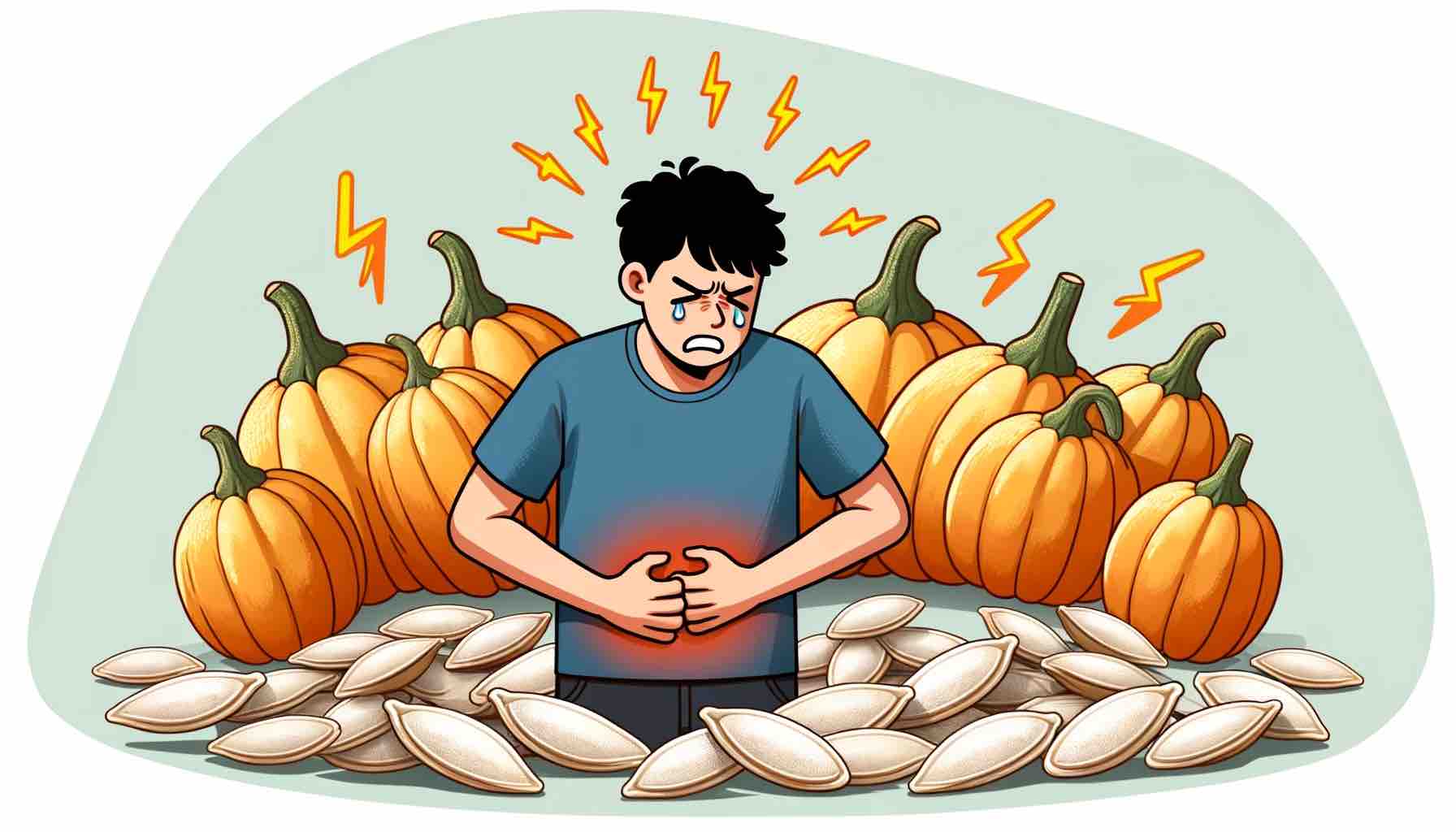
Introduction
Pumpkin seeds, known for their crunchy texture and nutty flavor, are often celebrated for their health benefits. But, as with all good things, there’s another side to the story. While they pack a nutritional punch, they also come with some caveats. Here’s a quick, punchy guide to the lesser-known disadvantages of munching on these popular seeds.
1. Digestive Discomfort: Too Much of a Good Thing
- Fiber Overload: Pumpkin seeds are fiber-rich, which is great, but overindulgence can lead to uncomfortable bloating and gas.
- The Balancing Act: Moderate your intake to avoid stomach discomfort and enjoy their benefits without the tummy troubles.
2. Beware of Extra Calories and Salt
- Calorie Dense: A handful of pumpkin seeds can add up in calories quickly – a fact often overlooked by avid snackers.
- Sodium Alert: Watch out for store-bought varieties that can be high in salt, posing a risk for those monitoring sodium intake.
3. Gastrointestinal Twists: Constipation and Diarrhea
- Fiber’s Double-Edged Sword: Too much fiber can cause constipation, while a sudden increase in fiber intake might lead to diarrhea.
- Listen to Your Gut: Keep an eye on how your body reacts and adjust your consumption accordingly.
4. Throat and Dental Hazards: Crunch with Care
- Hard on the Throat: The crunchy seeds, if not chewed properly, can irritate or even harm your throat.
- Dental Caution: For those with sensitive teeth or dental work, be mindful, as the seeds can be tough to crunch.
5. Unexpected Drowsiness: Tryptophan’s Effect
- Sleep Inducer: Thanks to tryptophan, pumpkin seeds might make you feel sleepy, not ideal if you need to stay alert.
- Time It Right: Enjoy them in the evening when you’re winding down.
Conclusion
Pumpkin seeds are a snack lover’s delight but remember, moderation is key. Be mindful of these potential disadvantages to enjoy pumpkin seeds in a way that’s both healthy and satisfying. So, the next time you reach for that bag of pumpkin seeds, think portion control, chew well, and maybe save them for your evening snack ritual!
10 FAQs on Disadvantages of Eating Pumpkin Seeds
- How can eating too many pumpkin seeds affect digestion?
Eating an excess of pumpkin seeds can lead to digestive issues like bloating, gas, and discomfort due to their high fiber content. Moderation is key to avoid these gastrointestinal upsets. - Can pumpkin seeds cause weight gain?
Yes, due to their high-calorie content, overconsumption of pumpkin seeds can contribute to weight gain. A quarter-cup of dried pumpkin seeds contains about 180 calories, so it’s important to monitor portion sizes. - Is it possible for pumpkin seeds to cause allergic reactions?
While uncommon, some individuals may experience allergic reactions to pumpkin seeds. Symptoms can range from mild to severe and may include skin rashes, itching, or more serious reactions like difficulty breathing. - Can consuming pumpkin seeds lead to bowel movement issues?
Yes, the high fiber content in pumpkin seeds can cause bowel irregularities. While they can aid in digestion when eaten in moderation, excessive consumption might lead to constipation or diarrhea. - Are pumpkin seeds harmful to consume if I have a throat condition?
The hard, crunchy texture of pumpkin seeds can aggravate the throat, especially if not chewed properly. People with throat conditions or swallowing difficulties should exercise caution. - Do pumpkin seeds affect blood pressure?
Pumpkin seeds are generally good for blood pressure management due to their magnesium content. However, salted varieties can increase sodium intake, which may impact blood pressure. - Can eating pumpkin seeds disrupt sleep patterns?
Pumpkin seeds contain tryptophan, an amino acid that promotes sleep. Consuming them in large quantities before activities requiring alertness might not be ideal. - Are pumpkin seeds safe for individuals with dental issues?
The hardness of pumpkin seeds can pose a risk to teeth, especially for those with dental sensitivities or dental work like crowns or braces. - How do pumpkin seeds impact blood sugar levels?
Pumpkin seeds have a low glycemic index, so they don’t significantly affect blood sugar levels. However, diabetic individuals should still consider the carbohydrate content in portion control. - Is it okay to eat pumpkin seeds daily?
Consuming pumpkin seeds daily is generally safe in moderate amounts. However, it’s important to consider the overall diet and individual health conditions, such as allergies or digestive issues.
Blog Tags
Pumpkin Seeds, Nutrition, Health Disadvantages, Digestive Health, Weight Management, Allergies, Throat Health, Dental Care, Sleep Quality, Blood Sugar Control, Daily Diet









